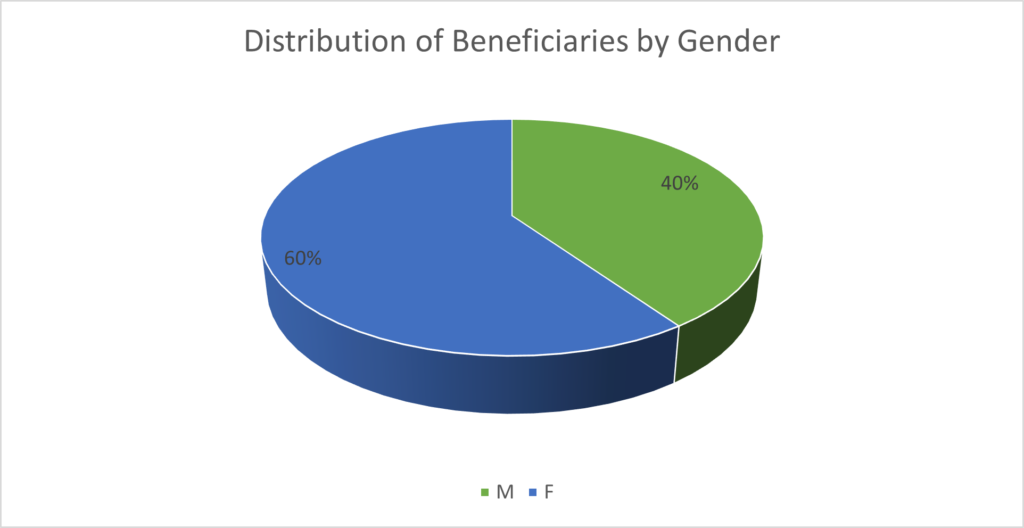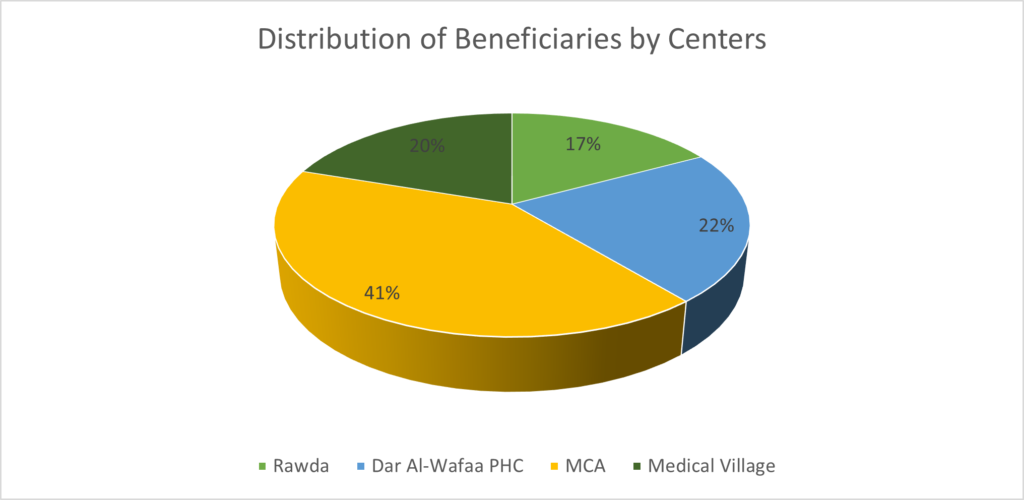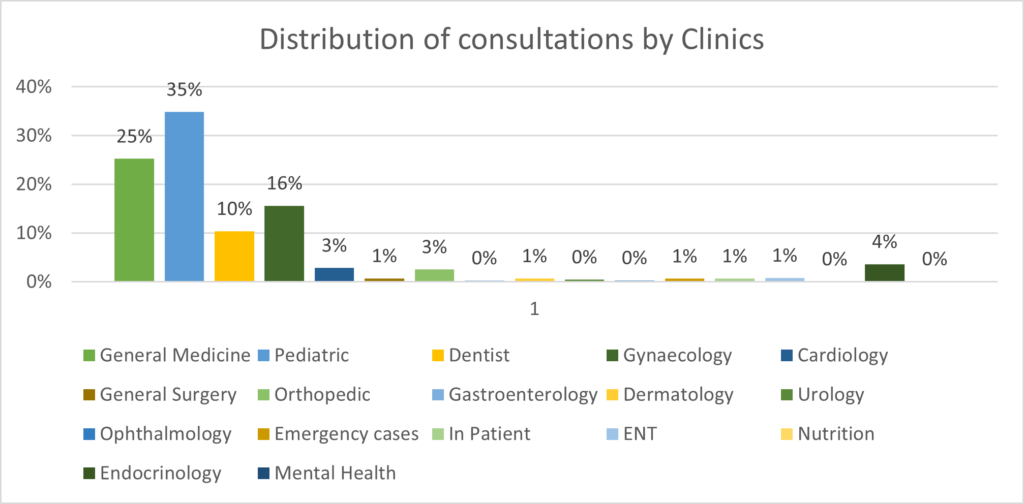Annual Report 2023
Ghawth is a local NGO established in 2009 by a group of doctors in Lebanon. The aim for establishing this NGO is to enhance the medical services for refugees and host community, and to ensure that the most vulnerable population groups will have access to primary, secondary, and tertiary healthcare services.
The 2023 annual report summarizes the progress made by Ghawth in its program goals, which fits with the following outcomes of the Lebanon Crisis Response Plan (LCRP):
Improve access to comprehensive primary healthcare (PHC).
Improve access to the hospital (incl. the E.R and O.R. care) and advanced referral care (advanced diagnostic laboratory and radiology care).
In addition, it identifies challenges, priorities, and recommendations.
Achievements of Ghawth:
Although the number of beneficiaries has not increased significantly from the previous year (+1471 beneficiaries), this is due to a lack of money rather than an improvement in Lebanon’s health status. The number of patients in need for whom we are unable to give care is steadily increasing in comparison to 2022.
The total number of beneficiaries in 2023 reached 97,414, with 39,265 males (40%) and 58,149 females (60%).

The distribution of the number of beneficiaries by nationality is shown below:
Nationality # %
Syrian 76695 79%
Lebanese 18616 19%
PRL 1193 1%
PRS 708 1%
Other 202 0%
Total 97414 100%

Primary Health care:
GHAWTH provides primary health care services to vulnerable Lebanese as well as other populations such as PRL, PRS, Syrian refugees, and migrants through four medical centers (PHCCs).
Dar Al Wafaa PHC.
Medical Village Dispensary.
Ghawth Dispensary-Aarsal (MCA).
Al Rawda Dispensary.
The comprehensive package of services includes consultation, vaccination, medication for acute and chronic conditions, child health, noncommunicable disease care, sexual and reproductive health, malnutrition screening and management, mental health, disability services, dental care, and health promotion and referral.
Primary health care is one of GHAWTH’s priorities in order to strengthen the health system in Lebanon.
Supported by (NORWAC, IMC, IOCC, ANERA), In 2023, GHAWTH provided 94,435 medical consultations, 5,363 children benefited from vaccination, and 47,782 patients benefited from medication.
Beneficiaries Distribution by Gender:
The total number of beneficiaries from primary health care in 2023 reached 97,138, with 39,074 males (40%) and 58,064 females (60%).

Beneficiaries Distribution by Medical Center:
The total number of Beneficiaries in 2023 are distributed on the four following medical centers:
Medical Center # %
Rawda 17,051 17%
Dar Al-Wafaa PHC 21,171 22%
MCA 39,792 41%
Medical Village 19124 20%
Total 97,138 100%

Consultations Distribution by Clinic:
Women and children constitute the largest number of beneficiaries of primary health care services (83 %), as the table below shows the distribution of the number of beneficiaries by clinics:
Clinic # %
General Medicine 23852 25%
Pediatric 32921 35%
Dentist 9819 10%
Gynecology 14767 16%
Cardiology 2706 3%
General Surgery 684 1%
Orthopedic 2415 3%
Gastroenterology 259 0%
Dermatology 663 1%
Urology 451 0%
Ophthalmology 301 0%
Emergency cases 620 1%
In Patient 638 1%
ENT 770 1%
Nutrition 57 0%
Endocrinology 3429 4%
Mental Health 83 0%
Total 45,545 100%

2-Secondary Health Care:
GHAWTH also provides secondary health care services to vulnerable Lebanese as well as other populations such as PRL, PRS, Syrian refugees, and migrants through GHAWTH Medical Centers and the contracted hospitals in all of Lebanon. The secondary health care services include cold surgeries and dialysis sessions.
In 2023, GHAWTH provided financial support to conduct 950 (21% Lebanese) surgeries and 14,101 dialysis sessions (Funded by NORWAC).
The total number of beneficiaries of dialysis sessions was 103 patients.
The distribution of the number of dialysis patients by gender is shown in the table below:
Beneficiaries Distribution by Gender (Dialysis Sessions)
Gender # %
Total Male 61 59 %
Total Female 42 41%
Total 103 100%
The challenges:
Aggravated impediments owing to the compounded multi-layered socioeconomic crisis have further damaged the meaningful access of displaced women, men, girls and boys, and other vulnerable groups to primary and secondary health services.
Access Challenges: Affordability, including the direct (Costs of surgeries and medications….) and indirect costs of services like transportation fees, remained the main challenge to accessing health care services in 2023. Additional barriers continue to hinder the accessibility and timely use of services in Lebanon at the supply and demand levels and are mainly related to availability (e.g., services and supplies, including medications; regarding renal failure patients, some hospitals faced a challenges in kits and medical supplies availability, in which they took a decision sometimes to reduce the number of sessions from three to two sessions weekly, and some of them informed the patients that they are short on stuff and they
cannot perform their sessions); geographical accessibility (e.g., remote areas); and acceptability (e.g., social stigma).
Funding Challenges: Most NGOs in Lebanon are suffering from a funding crisis due to the limited support provided by donors because of the successive global crises. This affected Ghawth’s ability to respond to the increasing needs, whether at the primary or secondary health care level.
Shortage in funding directly leads to reduced health care access and, consequently, increased morbidity and mortality. Ghawth got stretched in 2023 to prioritize life-saving interventions, leaving behind less severe, underfunded cases.
Increasing pressure from the Lebanese government on the issue of Syrian refugees contributed to increased tension and the intensity of hate speech directed at refugees, limiting some refugees’ ability to access primary or secondary health care due to the fear of moving without identification papers or valid residency.
The deteriorating security situation in southern Lebanon affected the availability of some medical supplies in the markets, as some INGO and hospitals activated emergency plans and increased their stock of medical supplies, which put additional pressure on their availability in the local market.
Priorities, and Recommendations:
To strengthen Lebanon’s health system, GHAWTH prioritizes primary health care. It also helps to alleviate demand for secondary health care, allowing us to get better results at a reduced cost. As a result, we invite supporters to boost their contributions to GHAWTH’s primary health care programs.
Securing additional funding for dialysis patients so that Ghawth can increase the number of patients for whom it covers the costs of dialysis sessions.
The Ministry of Public Health and the Social Security Fund are no longer able to cover the costs of surgical operations for the most vulnerable Lebanese patients who do not have third-party coverage.
As a result, alternate funding is required to handle such cases.
Support for Lebanese patients also contributes to social stability and decreases conflict between the Lebanese and refugee communities in Lebanon.
.




